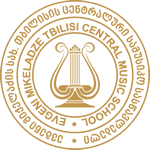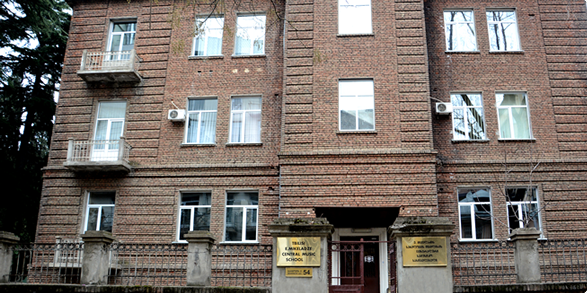Evgeni Mikeladze College of Music
∞
In 90th, E. Mikeladze Tbilisi Music Shool #9 moved to the new and challenging stage of its operation. The Soviet Union was demolished; cataclysm in Georgia as civil wars, political and social turmoil brought mere survival need and raised an issue of maintaining the rich music cultural tradition. Socio-cultural instability of the country caused vast migration, especially, from the music sphere. These conditions brought dangerous tendency in orchestras to loose professional performers. Major task became creation due platform for attracting gifted young people and support their music professional development.
In order to meet set targets, TbilisiMusicSchool #9 was transformed into Evgeni Mikeladze Music Colledge in 1991, focusing on strengthening orchestra direction and growing orchestra professionals. This integration gave a start to more profound reforms and transformation of the music education process into rather progressive and contemporary teaching methods.
The college introduced two-step education: 1-7 classes for beginners and middle special education upper 1-4 grade. After the graduation of the college, the students were awarded with Diplomas, as well as the qualification and work permits. The school curricula were thoroughly amended and new taught programs worked out based on the international best practices.
The first step (1-7 classes) of the college education where for 7-14 year children. At this level, college introduced exclusively only the first time in Georgia, differential model studies. Based on this model two taught programs: liberal and specialized were provided at the beginning level, taking into consideration students’ skills, gifts and future interests with regard of music profession.
Liberal model was based on “General Music Education” program following ordinary music school plans and taught course. The second was following the “Special Music Education” course, aiming more focused and advanced curricula approved by the Ministry of Culture of Georgia in 1991.
Flexible system of differential education model provided opportunity to select gifted children after the enrollment of exams in the Special Music Education group and others in the General music education group. The selected children had possibility to continue music education as a professional specialty right from the beginning.
Constant selection was carried out afterwards as well and based on the students’ merits and professional skills they were transferred in different learning groups graded by various intensity. This model excluded possibility to have weaker students unable to meet requirements of the academic class; meanwhile, strong students have possibility to be transferred into Special Music Sector. Meanwhile, all other students keep the same option to obtain high quality general music education.
Second level of the school consisted of four grades. It was based on confirmed curricula and its goals were oriented to professional middle special music education. Students who studied successfully in the intensive group (7 grades) were able to continue studies at this level.
Invited high-qualified teachers, hard work and intensive education curricula created strong ground for students’ successes, which was reflected in number of prizes and winning competitions as well as festivals. Some of them became presidents’ grantees and alumnus. The college graduates became well-known musicians who have been continuing their performance in Georgia and abroad.
Asiko (Akvsenti) Megrelidze (1937-2012), head of Orchestra Department, Honored teacher of Georgia and owner of Honored Knight Order, was among those whose immense contribution brought successful operation of Orchestra department.

